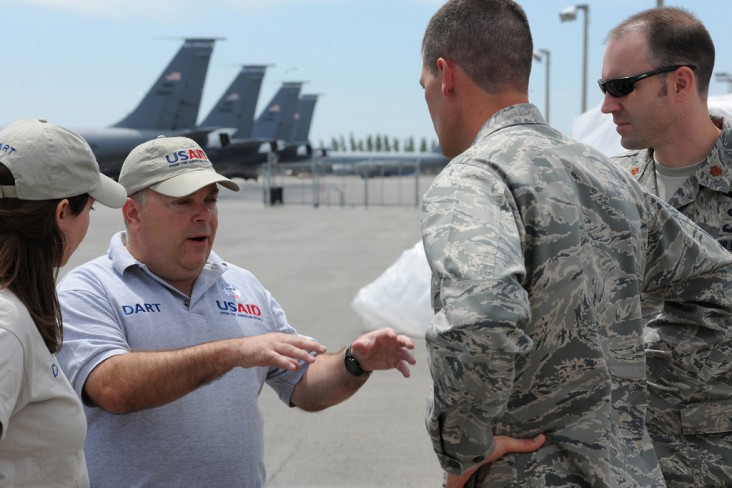- What We Do
- Agriculture and Food Security
- Democracy, Human Rights and Governance
- Economic Growth and Trade
- Education
- Environment and Global Climate Change
- Gender Equality and Women's Empowerment
- Global Health
- Humanitarian Assistance
- Transformation at USAID
- Water and Sanitation
- Working in Crises and Conflict
- U.S. Global Development Lab
Speeches Shim

USAID coordinates with other U.S. government agencies, including the U.S. Department of Defense (DoD) to provide overarching leadership for U.S. foreign humanitarian response operations. In situations where the U.S. military possess unique capability to deliver timely and efficient disaster relief, USAID’s Office of U.S. Foreign Disaster Assistance (OFDA) may request support from DoD, including personnel, supplies, equipment, or services as required. USAID/OFDA provides training to U.S. military personnel through facilitation of regular Joint Humanitarian Operations Courses and the assignment of Humanitarian Assistance Advisors to each of the DoD’s six geographic Combatant Commands and the Pentagon.
USAID’s Office of Civilian-Military Cooperation (CMC), formerly Office of Military Affairs, strengthens cooperation between the development and defense communities and enhance USAID’s role in the framework of national security. CMC assigns Senior Development Advisors to work with DoD’s combatant commands on a full spectrum of policies and activities that improve development outcomes and ensure they align with national interests. DoD military representatives are also assigned to CMC, allowing access and transparency in USAID-DoD coordination efforts.
The U.S. Department of State’s Bureau of Population, Refugees, and Migration (State/PRM) provides multilateral grants to international relief organizations in response to refugee and other emergency appeals and contributes to the regular program budgets of organizations such as the Office of the U.N. High Commissioner for Refugees (UNHCR) and the International Committee of the Red Cross (ICRC). The U.S. Department of State’s Bureau of Conflict and Stabilization Operations (State/CSO) works to lead, coordinate, and institutionalize U.S. Government civilian capacity to prevent or prepare for post-conflict situations, and to help stabilize and reconstruct societies in transition from conflict or civil strife.
The U.S. Department of Agriculture (USDA) provides food assistance to support emergency feeding programs in countries experiencing food shortages due to drought and civil conflict. The U.S. Geological Survey (USGS), the U.S. Department of Health and Human Services’ (DHHS) Centers for Disease Control and Prevention (CDC), USDA’s Forest Service (FS), the National Oceanic and Atmospheric Administration (NOAA), and the Environmental Protection Agency (EPA) are examples of other agencies that provide technical assistance, in coordination with USAID, in response to disasters and potential hazards overseas.

Comment
Make a general inquiry or suggest an improvement.